Maritime Agencies
INTERNATIONAL CUSTOMS DAY: Lilypond Export Command CAC Hails Contribution of Agric Sector To Nigeria’s Non-oil Exports

By Izuchukwu Ozoemena
That agricultural products now dominate non-oil exports and accounts for over 53% of total export value through the ports is a
reflection of the determination and commitment of stakeholders to enhance the quality and marketability of Nigerian agricultural products.
Customs Area Controller (CAC), Lilypond Export Command, Comptroller A. Y. Odusanya stated this in Lagos, Tuesday, while giving a rundown of activities at the Export Command for the year 2024 as the Nigeria Customs Service (NCS) joins the global community to celebrate the International Customs Day with the theme ‘Delivering on Its Commitment to Efficiency, Security and Prosperity’.
The year, 2024, the CAC recalled, marked a significant milestone in the growth of Nigeria’s non-oil export sector, with the total value of exported goods reaching N2,141,546,149.

“This represents a commendable increase compared to previous years, highlighting the resilience and potential of Nigeria’s export capabilities particularly in agricultural products, manufactured goods and solid minerals.”
Within the period under review, he added, agricultural exports earned $1,134,337,499, while manufactured goods, solid minerals and others attracted $340, 996,434, $335,687,305 and $330,524,912 respectively.
“In addition to the impressive export values, the Lilypond Export Command processed a total of 30,979 containers throughout the year, facilitating smooth logistics and ensuring timely delivery of goods to international markets. The 2.5% surcharge generated from the export of previously imported goods as provided for in the 2021 Fiscal Policy amounted to N275, 833,297 as revenue to the Federal Government.”
Giving a comparative analysis of the dispositions for 3rd and 4th quarter, 2024, Comptroller Odusanya remarked that generally, the 4th quarter under review witnessed an understandable decline in export cargo-processing following challenges associated with the unavailability of empty cargo boxes for stuffing, coupled with a decline in demand for exportable raw materials following the end-of-the-year holiday period around the world.
Despite this, the Nigerian Export Supervision Scheme (NESS) revenue collection recorded a growth of 32.51%, climbing from N5,333,343,692.86 to N7, 067,351,977.16, a growth which highlights the resilience in non-oil commercial exports, the CAC explained.
The value of shipments in the 4th quarter, he said, saw a decline of 16.44%, from $937,357, 129.9 to $783,221,101.38. The tonnage of exported goods also declined by 22.49%, from 405,979.72 metric tons to 314,671 metric tons.
The duty paid on export of previously imported goods also declined by 32.39%, from N136, 042,360 to N91,945,795.00.
Still on the remarkable performance of the non-oil export sector, he attributed this to seamless collaboration and cooperation the Nigeria Customs Service enjoys with the NPA and other notable export stakeholders.
“This synergy has fostered an environment conducive to trade, enabling exporters to navigate the complexities of international markets with greater ease.”
“I, therefore, would want to assure all stakeholders and partners in the export value chain that the Command under my watch is positioned to ensure a more efficient clearance process, combat illicit trade and promote economic development.”
In 2025, he stated, it is critical to . maintain this positive momentum.
“We encourage all stakeholders – exporters, logistics providers and regulatory bodies – to continue working together towards a profitable export exercise. The foundation laid in 2024 should serve as a springboard for even greater achievements in the coming year.”
He harped on the importance of compliance with international standards regarding quality and preservation to enhance competitiveness of goods generated from Nigeria at the international market.
“Special attention should be given to agricultural products, particularly those destined for far-east nations like China, Japan, Thailand and others. The use of chemicals on agricultural products must comply with the standard’s where preservation techniques ate critical to maintaining products integrity during transit.”
Customs
Tincan Customs Achieves N51.8Bn Surplus Above 2025 Revenue Target

By Izuchukwu Ozoemena
Seven days to the end of 2025, the Tincan Port Command of the Nigeria Customs Service has comfortably met her revenue target for the year, exceeding same by over N51.8 billion.
The Customs Area Controller, Comptroller Frank Onyeka who stated this in Lagos, Wednesday, announced that the Command generated a total of ₦1.576 trillion in revenue, surpassing its assigned target of ₦1.524 trillion by about ₦51.84 billion.
The performance which he described as remarkable came about following the decision of his officers and men to be on the path of discipline, professionalism and unwavering commitment to trade rules and regulations.
Other enhancers of the achievement, he explained, included the strict implementation of deliberate reforms, improved operational efficiency and a strong sense of collective responsibility.
He said that major contributors to the increased revenue in the year included bulk cargo, general merchandise and imported ‘tokunboh’ vehicles. Strict cargo examination procedures and full compliance with customs regulations ensured accurate assessment and collection of expected revenue.
The Command employed conscious efforts to eliminate revenue leakages and operational inefficiency even as multiple and unnecessary alerts were substantially curtailed by adopting a streamlined alert management and enhanced internal coordination.
“This strategy improved operational efficiency without compromising effective customs control”, the CAC disclosed.
Commending the role of stakeholders engagement in the realization of the annual revenue, Onyeka recalled regular interaction with importers, licensed customs agents, terminal operators and shipping companies.
Diligent enforcement coupled with intelligence-driven operations also resulted in massive seizure of prohibited and undeclared goods.
“These seizures reflect our determination to facilitate trade while safeguarding national security, public safety, and economic integrity”, he remarked.
He assured that the Command is ever ready to sustain and improve on the 2025 revenue performance and compliance enforcement. All revenue due to the federal government will be properly assessed, collected and remitted at all times.
The Tin Can Island Port Customs boss expressed appreciation to the Comptroller General of Customs, Dr. Adewale Adeniyi for his strategic leadership and institutional support, noting that the Command’s success aligns with the Service’s ongoing reform and modernisation agenda.
He also commended stakeholders for their cooperation and commitment to improved compliance and adherence to extant rules.
“As we progress, the Command remains focused on consolidating these gains, deepening transparency, and contributing meaningfully to the federal government’s fiscal objectives”, Onyeka stated.
Customs
NSC Boss, Akutah, Speaks At Maritime Journalists’ Seminar, Harps on Developing Trends the Press Cannot Overlook.
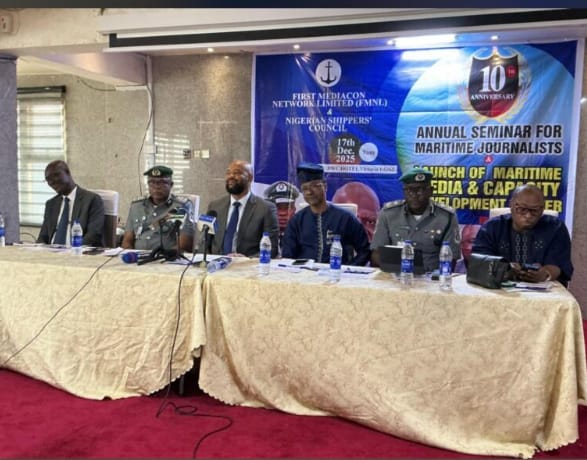
By Izuchukwu Ozoemena
It has been canvassed that as the maritime industry grows in complexity, driven by digitalization, new trade realities, regulatory reforms and global logistic shifts, journalism practice within the space should toe the same line.
Dr Pius Ukeyima Akutah, the Executive Secretary/CEO of the Nigerian Shippers’ Council (NSC) stated this in a keynote address he delivered in Lagos, Thursday, during the 10th Anniversary Annual Seminar for Maritime Journalists hosted by First Mediacon Network Ltd, publishers of Shipping Position Daily.
Acknowledging that the Nigerian Shippers’ Council has benefitted immensely from the sustained and professional coverage offered by the maritime press, more collaborative efforts is needed to enhance efficiency and competitiveness in the port environment. He was represented by the agency’s Director of Special Duties, Mr Moses Abere.
”This decade-long journey affirms a simple truth: no maritime sector can advance without a strong, knowledgeable and committed media community.” Akutah added.
Strengthening maritime journalism for the future, he noted, requires technical accuracy, understanding of global practices and an appreciation of regulatory frameworks.
The journalist should also be equipped to interrogate data, utilize digital tools and apply emerging technologies such as Al in research, storytelling and analysis.
He added that in a sensitive sector such as maritime, misinformation can undermine policy, investor confidence and national economic stability.
”At the Nigerian Shippers’ Council, we remain committed to open communication and structured engagement with the media to enhance mutual understanding and sectoral development.”
Akutah assured that the NSC would continue to partner with the press through knowledge-sharing, capacity-building collaborations and joint initiatives that support a more informed and capable maritime media landscape.
”As the Port Economic Regulator, the Nigerian Shippers’ Council remains committed to promoting efficiency, transparency and competitiveness within the maritime sector.”
”We consider the media as essential partners in informing stakeholders, shaping public understanding and strengthening accountability.”
”We will continue to support credible and responsible maritime journalism and are open to meaningful engagements that enhance professionalism and knowledge within the press community.”
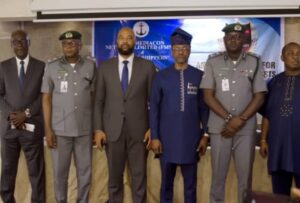
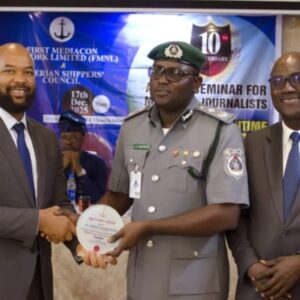
Dr Akabogu (left) presenting a souvenir to Dr Maiwada, National PRO, Nigeria Customs Service.
As the press celebrates
a 10-year milestone, Akutah advised, there should be a commitment to build a stronger future, one defined by accurate information, robust collaboration and shared progress.
Unveiling the Centre for Maritime Media & Capacity Development at the event, Mr Sesan Onileimo, CEO First Mediacon Network Ltd stressed the need to future-proof maritime reporting in Nigeria. The new Centre, he said, was created to respond to rapid changes reshaping journalism and the maritime sector.
“The maritime media space is evolving rapidly under the pressure of digitalisation, artificial intelligence and social media. This Centre is our bold response to ensure journalists remain knowledgeable, relevant and impactful, regardless of how long they have been on the beat,” Onileimo explained.
The Centre, he added, would not only take over the organisation of the annual seminar but would also deliver continuous, year-round manpower development programmes for maritime journalists and content creators.
“What we are doing is moving from an annual event to a permanent structure for capacity development. The Centre is also open to partnerships with industry stakeholders who share our vision of a stronger and more professional maritime media,” Onileimo added.
Dignitaries at the event included Mr Babandede, ACG Zone ‘A’ of the Nigeria Customs Service accompanied by the National Public Relations Officer, Dr Aliyu Maiwada, notable maritime lawyer Dr Emeka Akabogu (SAN) and Dr Kayode Farinto, former Acting National President of ANLCA.
Maritime Agencies
NIGERIA’S IMO FEAT: NIMASA Hails Media Contributions, Seeks Support For Sustained Momentum.

By Izuchukwu Ozoemena
The Nigerian Maritime Administration and Safety Agency(NIMASA) has acknowledged the invaluable support and contributions of Nigerian journalists, especially the maritime media, to the recent success of Nigeria at the International Maritime Organization(IMO) elections.
It could be recalled that Nigeria won the elusive category C council election at the IMO after 14 years of failed attempts.
Receiving the new leadership of the Maritime Reporters Association of Nigeria (MARAN) led by Mr Tunde Ayodele at the Headquarters of NIMASA, Edward Osagie, the Deputy Director and Head of the Public Relations Department of the agency noted that maritime media complemented the untiring efforts of the Ministry of Marine and Blue Economy and NIMASA to showcase the enormous maritime potentials of Nigeria and its capacity in maritime administration that eventually won the country the coveted global seat.
The NIMASA Chief spokesman highlighted the importance of developmental journalism to nation’s building while admonishing the media, especially maritime media, to guard against reportorial styles that could de-market the country.
”The international community is taking note of every single report we write as journalists about the country and it’s what they use to assess us as a nation.
” That is why it is imperative for us as journalists to allow patriotism and commitment to nation building guide the way we write”
He however frowned at attempt by few journalists to push wrong narrative over the recent incident of the arrest of a vessel, MT SKIPPER , detained by the United States Coast Guard (USCG)over alleged crude oil theft and other transnational crimes.
Osagie reiterated the fact that the detained vessel was neither flying Nigerian flag nor its purported owners, Thomarose Global Ventures Limited, registered with NIMASA as a shipping company.
He said that what identifies a vessel is the flag it flies and since the detained vessel did not carry Nigeria’s flag, those who tried to ascribe its ownership to Nigeria did so either out of sheer mischief or ignorance.
Osagie however lauded MARAN for its responsible journalism, acknowledging the support of its members to NIMASA despite the agency’s perceived shortcomings in their expectations.
” Despite the fact that the agency may not have met all the expectations of members of MARAN, they haven’t written negative reports on our activities and operations” Osagie noted.
” MARAN brand is a brand I am proud of and we are also proud of in the
industry. MARAN has not done badly in its reportorial duties.
”At NIMASA here, we will support anything you request and in any area we are able to support, we will support the administration for a smooth management of the association.
”And by the grace of God, we will not let you down. God bless you.God bless MARAN” NIMASA Chief image maker declared.
Ayodele has led his caretaker committee members to NIMASA to consolidate on the long-standing relationship between the agency and MARAN.
Leading his PR team to receive the MARAN leadership, Osagie expressed happiness on the visit which he believed will further boost the cordial relationship between the two parties
”I am glad that you’re here today. It’s a special day. I’m glad to have you in our midst today” Osagie enthused.
The two parties engaged in frank discussions aimed at enhancing their operations and further boost their shared values and partnership.
Ayodele informed his hosts that MARAN will continue to practise responsible journalism that will enhance the operations of NIMASA in particular and boost the credibility of the country to the outside world.
He therefore asked NIMASA to reciprocate this gesture through actions that will enhance the professional integrity and impact the welfare of his members.
Osagie however pledged the support of the agency for the new caretaker committee and the MARAN as a whole, a situation he said is in alignment with the belief of NIMASA’s management in the values which the agency shares with the association.
-

 Maritime Agencies2 weeks ago
Maritime Agencies2 weeks agoIndustry Gurus Head To Badagry As BACCIMA, Portbizness Discuss Trans-Border International Trade.
-

 Maritime Agencies1 week ago
Maritime Agencies1 week agoFIGHT AGAINST FINANCIAL CRIMES: MMIA CAC Makes Huge Haul of Foreign Currencies, Hands Over To EFCC
-

 Maritime Agencies2 weeks ago
Maritime Agencies2 weeks agoMARITIME SEMINAR FOR JUDGES: Group Urges Probe of Shippers’ Council Funds.
-

 Maritime Agencies3 weeks ago
Maritime Agencies3 weeks agoOGUN 1 CUSTOMS: DC Oladapo Afeni Pledges Stronger Trade Facilitation, Border Security As He Becomes Acting CAC.
-

 Maritime Agencies2 weeks ago
Maritime Agencies2 weeks agoWIKE AT 62: TSSL Celebrates Courage, Conviction and Unwavering Sense of Duty.
-
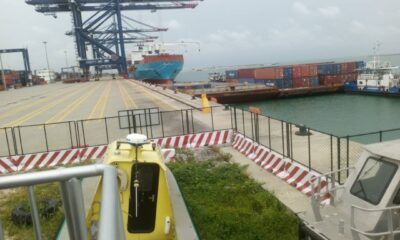
 Maritime Agencies1 week ago
Maritime Agencies1 week agoLekki Deepsea Port Set to Achieve Full Capacity Before Expectations, Deepens Barge Operations, among others.
-
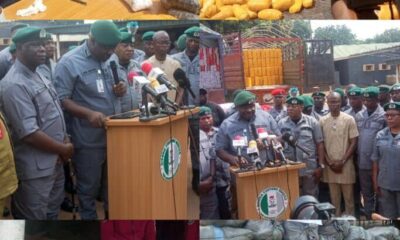
 Maritime Agencies1 week ago
Maritime Agencies1 week agoOGUN 1 CUSTOMS: No Hiding Place for Smugglers, D.C.Afeni Pledges, Confiscates Exotic Cars, 2bn Worth of Contrabands in 11 Days.
-

 Maritime Agencies1 week ago
Maritime Agencies1 week agoNIGERIA’S IMO FEAT: NIMASA Hails Media Contributions, Seeks Support For Sustained Momentum.



























